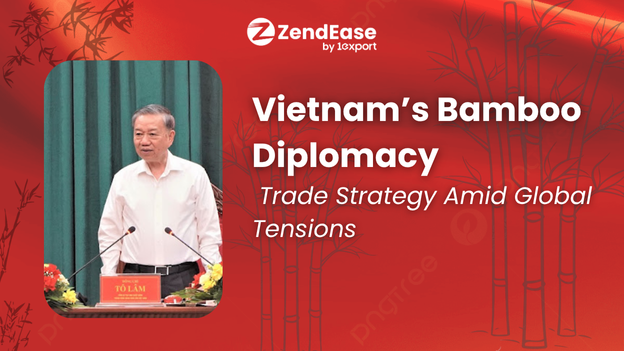Vietnam’s Bamboo Diplomacy: Trade Strategy Amid Global Tensions
by Ly Nguyen on Oct 09, 2025

In recent years, the phrase “Bamboo Diplomacy” has become a defining term for Vietnam’s approach to foreign policy and trade. As global tensions rise — from the U.S.–China trade rivalry to regional conflicts and supply chain disruptions — Vietnam has attracted attention for the way it manages to remain flexible, cooperative, and resilient. This strategy not only shapes political relations but also has a direct impact on how the country engages with international commerce.
The Meaning of Bamboo Diplomacy
Bamboo has long been a cultural symbol in Vietnam. It is strong at the roots yet flexible enough to bend with the wind. This imagery is used to describe how Vietnam seeks to conduct its international relations: adaptable to shifting global dynamics while remaining firmly rooted in protecting national interests.
Rather than aligning strictly with one power or another, Vietnam emphasizes balance. It welcomes cooperation with diverse partners while maintaining independence in decision-making. This diplomatic philosophy has allowed the country to expand its role in the global economy, even as geopolitical uncertainties increase.
Putting Bamboo Diplomacy into Practice
Vietnam’s foreign policy is often described as “multilateral and diversified.” In practice, this means:
- Maintaining relations with multiple major powers: Vietnam works to strengthen ties with the U.S., China, the EU, Japan, South Korea, and ASEAN neighbors.
- Expanding trade agreements: The country has signed or joined several major free trade agreements (FTAs), including the EU–Vietnam Free Trade Agreement (EVFTA), the Comprehensive and Progressive Agreement for Trans-Pacific Partnership (CPTPP), and the Regional Comprehensive Economic Partnership (RCEP).
- Welcoming investment and supply chain shifts: As global companies seek alternatives to reduce risk from overdependence on China, Vietnam has positioned itself as a competitive manufacturing hub.
This combination of diplomacy and economic policy reflects the “bamboo” approach — flexible enough to engage many partners, but strong enough to uphold core priorities.
Trade Opportunities and Challenges
Bamboo Diplomacy has created notable opportunities for Vietnam’s economy:
- Diversified markets: Vietnamese goods now reach not only Asia but also Europe and North America. This reduces reliance on any single export destination.
- Growing foreign investment: Vietnam consistently ranks among the top recipients of FDI in Southeast Asia, with investments in electronics, textiles, and renewable energy.
- Enhanced reputation: The country is increasingly recognized as a stable and reliable partner for trade and cooperation.
At the same time, challenges remain:
- Dependence on imported materials: Many industries in Vietnam still rely heavily on imported inputs, making them vulnerable to global supply disruptions.
- Competitive pressure: As more countries position themselves as alternative manufacturing hubs, Vietnam must continue to improve its infrastructure and workforce skills.
- High compliance standards: Entering markets such as the EU or the U.S. requires strict adherence to regulations on quality, sustainability, and labor practices.
Balancing these opportunities and challenges will determine how effectively Vietnam can sustain its growth in the years to come.
A Strategy for the Future
Bamboo Diplomacy is not just a metaphor — it is a practical strategy for navigating an unpredictable world. By remaining open, adaptable, and rooted in national priorities, Vietnam has positioned itself as a bridge between economies and as a resilient player in global trade.
As supply chains continue to evolve and geopolitical tensions persist, Vietnam’s approach offers a lesson in how flexibility and resilience can create space for growth, even in uncertain times. The country’s challenge now is to build on its progress — strengthening domestic industries, upgrading infrastructure, and ensuring that its economic gains are sustainable.
In doing so, Vietnam demonstrates that diplomacy and trade are deeply connected. The “bamboo” approach is not only about politics; it is also about building an economy that can bend with the wind without breaking.
Want to understand how these global shifts could affect your supply chain in Vietnam? Get in touch with ZendEase today — we’ll help you find the smoothest route forward.